Address
Dubai, UAE
Work Hours
Monday to Friday: 9AM - 6PM
Weekend: 10AM - 5PM
Address
Dubai, UAE
Work Hours
Monday to Friday: 9AM - 6PM
Weekend: 10AM - 5PM

Are you looking for the best SERP tracking tools to monitor your website’s rankings? Look no further. In this article, we will review the top 10 SERP tracking tools that are a must-have for every SEO enthusiast.
Whether you are an individual blogger or a digital marketing agency, tracking your keyword rankings is crucial for staying ahead of the competition. We will explore the features, pros, and cons of each tool to help you make an informed decision. So, let’s dive in and discover the best SERP tracker for your needs!
Tracking your search engine results page (SERP) rankings is essential for several reasons:
When selecting a SERP tracking software for your business, consider the following factors:
Ahrefs was launched as a website analysis tool in 2010. Ahrefs does not disclose its exact client numbers. However, as of October 2021, Ahrefs reported having over 700,000 active users. The pricing range for Ahrefs starts from $99 per month to $999 per month, depending on the plan chosen.
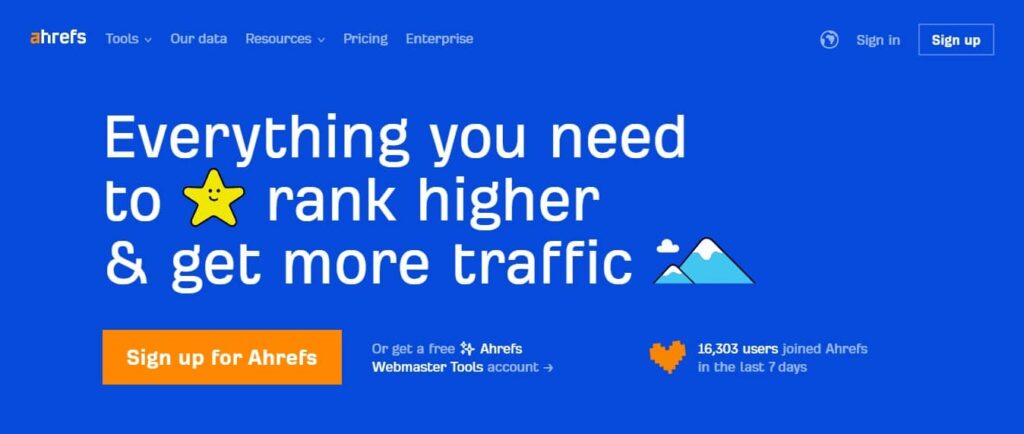
Ahrefs offers a wide range of features to help businesses and SEO agencies track their SERP performance effectively. Here are some key features that make Ahrefs stand out:
1. Comprehensive SEO data: Ahrefs offers a wide range of data including backlink analysis, keyword research, site audits, competitor analysis, and more. This comprehensive data can help improve your SEO efforts.
2. Accurate backlink analysis: Ahrefs has one of the most extensive backlink databases, providing accurate and detailed information about your own backlinks and those of your competitors. This information helps in identifying link opportunities and improving your website’s authority.
3. Keyword research: Ahrefs provides valuable insights into keyword rankings, search volumes, and keyword difficulty. This helps in finding high-performing keywords and optimizing your content accordingly.
4. Competitor analysis: Ahrefs offers powerful competitor analysis tools that allow you to compare your website’s performance with your competitors. You can analyze their backlinks, keywords, and traffic, and identify strategies to gain a competitive advantage.
5. Site audit: With Ahrefs, you can perform a comprehensive site audit to identify technical SEO issues that may be affecting your website’s performance. This helps in optimizing your site for better search visibility.
1. Expensive pricing: Ahrefs is considered relatively expensive compared to some of its competitors. The pricing plans may not be suitable for small businesses or individuals with limited budgets.
2. Steep learning curve: Ahrefs is a complex tool with many features and options. It may take some time to fully understand and utilize the wide range of functionalities it offers.
3. Limited focus on content analysis: While Ahrefs provides valuable keyword research data, it does not offer in-depth content analysis features as some other tools do. This means you may need to rely on additional tools for content optimization.
4. No social media management: Ahrefs primarily focuses on SEO analysis and does not have built-in social media management features. If you are looking for a tool that covers social media management as well, you may need to consider other options.
5. Limited user access: Ahrefs has limitations on the number of users who can access the tool under a single subscription, making it less suitable for larger teams or agencies with multiple users requiring access. Additional user seats may come at an extra cost.
Semrush was launched in 2008 and is reported to have over 7 million users as of 2021. The pricing range of the tool starts at $129.95 per month and goes up to $499.95 per month.
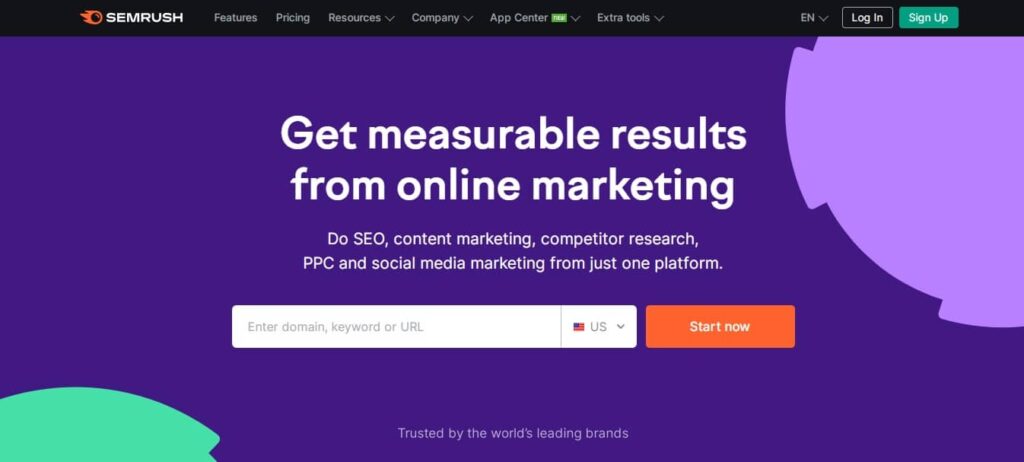
1. Comprehensive Toolkit: Semrush is an all-in-one SEO tool that offers a wide range of features and tools to manage various aspects of SEO, including keyword research, website audit, competitor analysis, rank tracking, and more. It provides users with the necessary tools to enhance their website’s visibility and performance.
2. Extensive Keyword Database: It has a massive database of keywords, including long-tail and related keywords, to help users find the right keywords for their SEO strategy. This enables users to target specific keywords and optimize their content accordingly.
3. Competitor Analysis: It allows users to analyze their competitors’ strategies, including their backlinks, organic and paid search keywords, top-performing content, and more. This helps users identify opportunities, benchmark their performance, and develop effective strategies to outperform their competitors.
4. Track Website Performance: Users can track their website’s ranking positions for specific keywords, monitor organic and paid traffic, analyze backlink profiles, and identify any issues that may impact their website’s performance. This helps users make data-driven decisions to improve their website’s visibility.
5. User-Friendly Interface: Semrush offers an intuitive and user-friendly interface, making it easy for users of all skill levels to navigate and utilize its features effectively. The platform provides clear instructions and offers various resources, such as webinars and tutorials, to help users understand and leverage its tools.
1. Steep Learning Curve: While Semrush is feature-rich, it can be overwhelming for beginners or users who are unfamiliar with SEO concepts and terminology. It might take some time to fully grasp and maximize the tool’s potential.
2. High Price: SEMrush’s pricing can be relatively costly, particularly for small businesses or individuals on a tight budget. Its premium features and extensive database come at a premium price, which may not be feasible for everyone.
3. Limited Local SEO Features: Semrush is known for its global approach to SEO, but it does not offer as many features or data specific to local SEO optimization. Users focusing primarily on local SEO may find certain tools and functionalities lacking.
4. Inaccurate Metrics: Some users have reported occasional discrepancies or inaccuracies in Semrush’s data, especially when it comes to traffic estimations or keyword difficulties. While these issues are generally minor, it is important for users to cross-reference and verify information from other sources.
5. Limited Social Media Management: While Semrush provides some social media management features, it is primarily focused on SEO. Users seeking more comprehensive social media management tools may need to look for alternatives that specialize in that area.
The SERP tracking tool MOZ was launched in 2004, and it is estimated that there are over 30,000 subscribers using the tool. The pricing range for the tool starts at $99/month and goes up to $599/month.
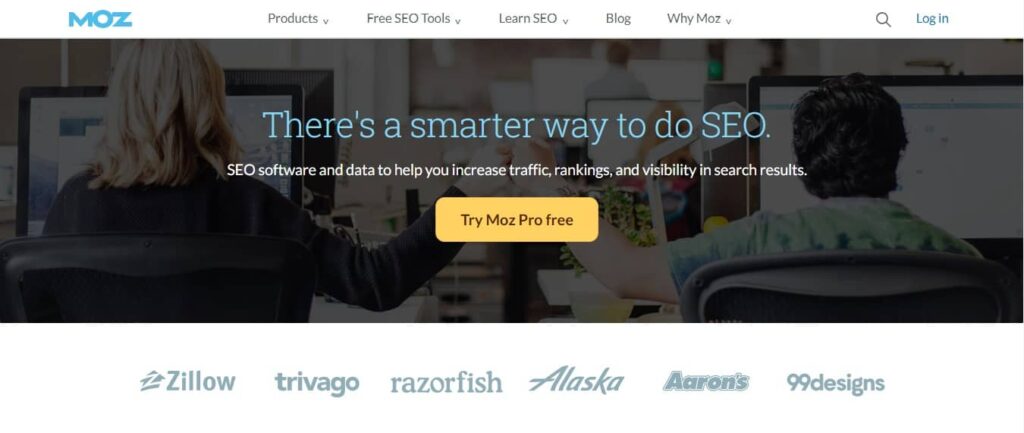
1. Comprehensive SEO tools: Moz offers a wide range of powerful SEO tools, including keyword research, link analysis, site audits, and rank tracking. This helps you optimize your website and improve its visibility in search engines.
2. Accurate and reliable data: Moz collects and provides reliable data on domain authority, page authority, backlinks, and keyword rankings. This data can be valuable for evaluating your own website’s performance and analyzing competitors.
3. High-quality educational resources: Moz provides an extensive library of educational resources, including blog articles, videos, and webinars. These resources can help you stay updated with the latest SEO trends and enhance your knowledge.
4. User-friendly interface: The Moz interface is intuitive and easy to navigate. Even if you are not an SEO expert, you can easily grasp the tools and features and utilize them effectively for your website.
5. Active community and customer support: Moz has an active and helpful community where you can ask questions, engage in discussions, and seek advice. Additionally, their customer support is responsive and willing to assist with any issues or inquiries.
1. Limited data access in the free version: While Moz offers a free version, it has limitations on data access and the number of features. To fully utilize Moz’s capabilities, you may need to subscribe to a paid plan.
2. Cost: Moz’s pricing can be relatively expensive compared to some other SEO tools, especially for smaller businesses or individuals with limited budgets.
3. Steep learning curve: Although Moz provides educational resources, learning and mastering all the features and strategies can take time. For beginners in SEO, it might be overwhelming initially.
4. Some features require additional tools: While Moz offers various tools, it may lack certain functionalities present in specialized tools. You might need to use additional tools alongside Moz to fulfill all your specific SEO requirements.
5. Competitor analysis limitations: While Moz provides insights into competitor metrics, there are limitations in terms of competitor monitoring, on-page analysis, and keyword research compared to dedicated competitor analysis tools.
SERanking was launched in 2013 and the estimated number of subscribers using the tool is around 400,000. The pricing range of the tool starts at $44.00 per month and goes up to $191.20 per month.
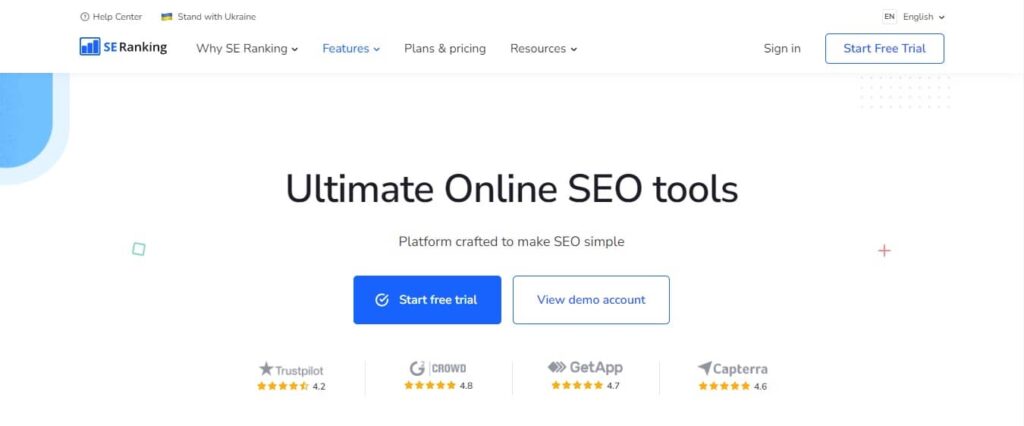
1. Comprehensive features: SE Ranking offers a wide range of SEO tools and features, including keyword research, position tracking, website auditing, backlink analysis, and competitor analysis. This provides a complete SEO solution for businesses.
2. User-friendly interface: The platform has a clean and intuitive interface that makes it easy to navigate and use. It is suitable for both beginners and experienced SEO professionals.
3. Accuracy in rank tracking: SERanking provides accurate rank tracking for keywords on different search engines and locations. This helps businesses monitor their search engine rankings effectively.
4. Competitor analysis: The tool allows you to analyze and compare your website’s performance against competitors. This helps in identifying areas of improvement and finding new opportunities.
5. White-label reporting: SERanking offers white-label reporting features, allowing users to generate professional and branded reports to share with clients or team members.
1. Pricing structure: SE Ranking’s pricing can be a drawback for small businesses or individuals with limited budgets. The more advanced features and higher keyword limits come at a higher cost.
2. Limited integrations: Although SE Ranking integrates with popular platforms like Google Analytics and Google Search Console, it has limited integration options compared to some other SEO tools.
3. Learning curve: While the platform is user-friendly, some of the more advanced features may require a learning curve for users who are new to SEO.
4. Limited social media monitoring: SE Ranking’s focus is primarily on SEO, and its social media monitoring features are not as advanced or extensive as those provided by dedicated social media management tools.
5. Limited language support: Although SERanking supports multiple languages, some less commonly spoken languages may not be fully supported, limiting its usability for businesses targeting specific international markets.
AccuRanker, was launched in 2013 and currently has an estimated number of subscribers exceeding 30,000. The pricing range for the tool starts at $129 per month, they also offer a 14-day free trial with a suite of SEO tools.
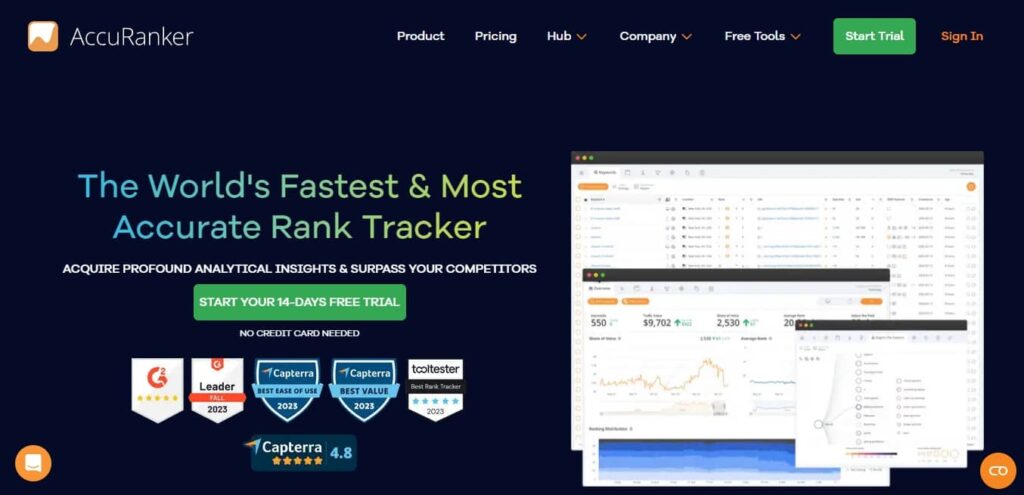
AccuRanker is a powerful SERP tool that offers a wide range of features and capabilities to help businesses monitor and improve their search engine rankings. Here are some of the key features:
1. Real-time tracking: AccuRanker provides real-time tracking of keyword rankings, allowing users to monitor their website’s performance accurately and make data-driven decisions promptly.
2. Accurate data: AccuRanker claims to deliver accurate and reliable ranking data by using proprietary technology and ensuring transparency in data sources.
3. User-friendly interface: The platform has a user-friendly interface that makes it easy to navigate and understand the data, even for beginners.
4. Customizable reports: AccuRanker allows users to create customized reports with different metrics, time frames, and data visualization options, which can be useful for presenting data to clients or internal stakeholders.
5. Competitor analysis: The tool provides insights into competitors’ rankings, allowing users to benchmark their performance and identify potential opportunities.
1. Limited integrations: AccuRanker offers limited integrations with other marketing tools, which may be a drawback for users who want to combine their SEO data with other analytics tools.
2. Higher price: Compared to some other rank tracking tools, AccuRanker may have a relatively higher pricing structure. This can be a drawback for small businesses or budget-conscious users.
3. Geographic coverage: AccuRanker primarily focuses on tracking keyword rankings in Google, Bing, and YouTube search engines. It may not offer extensive coverage of other search engines or different countries’ search markets.
4. Lack of additional SEO features: While AccuRanker excels at rank tracking, it lacks some of the advanced SEO features found in comprehensive SEO suites, such as on-page optimization, backlink analysis, or keyword research tools.
5. Learning curve: Although the user interface is generally intuitive, using the more advanced features of AccuRanker may require some learning and familiarity with SEO terminology and concepts. This might be challenging for beginners or users with limited SEO knowledge.
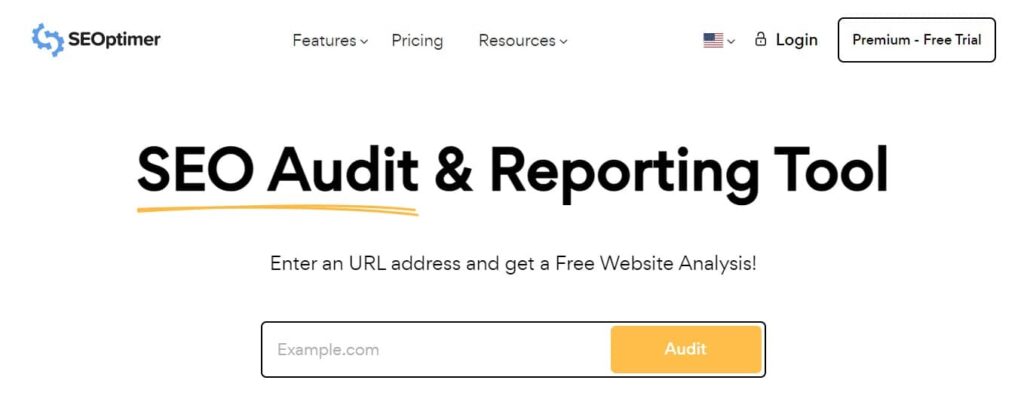
SEOptimer is a comprehensive SEO analysis tool designed to help businesses improve their website performance and optimize their online presence. It provides users with a detailed report, highlighting areas for improvement such as broken links, page speed, and keyword usage. The pricing range of SEOptimer starts from $19/month and goes up to $59/month depending on the plan and features.
1) Comprehensive Website Analysis: SEOptimer provides a detailed analysis of various aspects of your website, including SEO, usability, social media, and more. It offers insights into areas that can be improved to enhance your website’s performance.
2) User-Friendly Interface: The platform has a clean and intuitive interface, making it easy for users to navigate and understand the analysis reports. The results are presented in a visually appealing and easily digestible format.
3) Customizable Recommendations: SEOptimer offers tailored suggestions and recommendations for each website based on its specific needs. This allows users to focus on the most relevant improvements and prioritize their optimization efforts.
4) Competitive Analysis: The tool provides insights into your competitors’ SEO strategies, allowing you to identify areas where they may have an advantage. This information can help you adjust your own tactics to gain a competitive edge.
5) White-Label Reports: SEOptimer offers white-label reporting, allowing users to brand the reports with their own logo and company details. This feature is beneficial for agencies and professionals who want to provide branded reports to their clients.
1) Limited Free Plan: The free plan of SEOptimer has certain limitations in terms of the number of reports you can generate and the features available. To access advanced features and unlimited reports, you need to upgrade to a paid plan.
2) No Continuous Monitoring: SEOptimer provides a one-time website analysis, which means it doesn’t offer continuous monitoring or regular updates on your website’s performance. This feature could be useful for users who want ongoing optimization insights.
3) Limited Keyword Analysis: Although SEOptimer provides some keyword-related suggestions and basic analysis, it doesn’t offer extensive keyword research tools or tracking capabilities. For users looking for in-depth keyword analysis, they may need to rely on additional tools.
4) Technical Knowledge Required: While SEOptimer provides valuable insights, some of the recommendations may require technical knowledge or development skills to implement. Users with limited technical expertise may need additional help to execute certain optimization tasks.
5) Inconsistent Results: Some users have reported inconsistencies in the analysis results provided by SEOptimer. While the tool generally provides accurate information, occasional discrepancies or errors have been noted. It’s always recommended to cross-verify results with other reliable sources.
Nightwatch simplifies the process of tracking keyword rankings, measuring search visibility, and identifying opportunities for optimization. The SERP tracking tool Nightwatch was launched in May 2018. Nightwatch’s pricing ranges from $32 to $559 per month, depending on the selected plan and the number of keywords tracked.
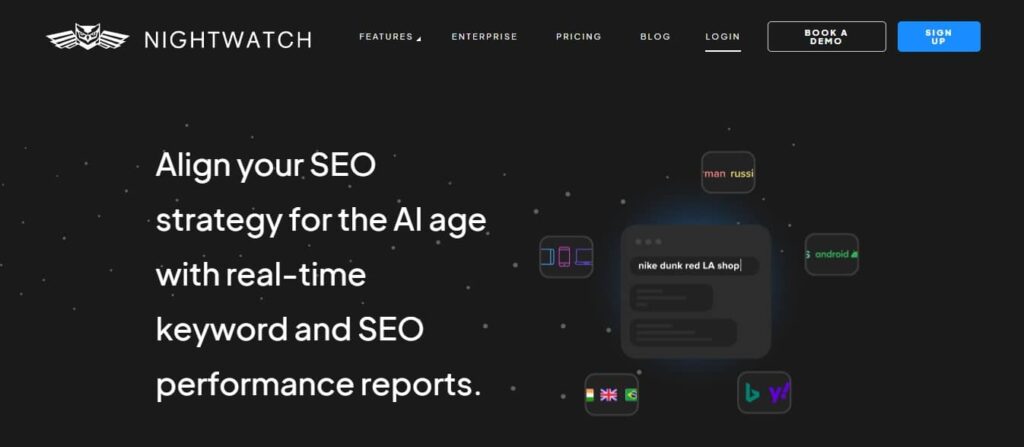
1. Advanced Rank Tracking: Nightwatch provides highly accurate and up-to-date rank tracking features, including tracking of local rankings, mobile rankings, and featured snippets. It allows users to track their website’s performance across multiple search engines and locations.
2. Website Analytics: Nightwatch includes comprehensive website analytics features, such as tracking organic and paid traffic, monitoring visitor behavior, and analyzing conversion rates. It provides insights into the overall performance of the website and helps identify areas for improvement.
3. Reporting and Automated Alerts: Nightwatch offers customizable reports and automated alerts. Users can generate detailed reports with various metrics and analytics, which can be scheduled to be sent automatically. The tool also alerts users about significant changes in rankings, traffic, or other metrics, helping them stay updated with their website’s performance.
1. Accuracy: Nightwatch provides accurate and precise data on keyword rankings, ensuring that you have reliable information on how your website is performing in search engine results pages (SERPs).
2. Customization: The tool offers a wide range of customization options, allowing you to monitor specific keywords, search engines, locations, and devices, according to your specific needs.
3. User-friendly interface: Nightwatch has an intuitive and user-friendly interface, making it easy for users, even those without technical expertise, to navigate and utilize the tool effectively.
4. Comprehensive reporting: The tool provides detailed reports on keyword rankings, search visibility, and other important metrics, enabling you to analyze and monitor your website’s SEO performance comprehensively.
5. Competitor analysis: Nightwatch allows you to track and analyze the rankings and performance of your competitors, providing valuable insights for optimizing your SEO strategy.
1. Cost: Nightwatch may be relatively expensive for some small businesses or individuals with limited budgets, especially compared to other SERP tracking tools available in the market.
2. Speed: Some users have reported that Nightwatch’s data retrieval and refresh speed can be slow at times, which may be a drawback if you require real-time or near real-time data.
3. Limited local packs tracking: Although Nightwatch provides support for tracking localized search results, it may have limitations in accurately tracking and analyzing local search engine features like local packs.
4. Learning curve: While Nightwatch has a user-friendly interface, mastering all the features and utilizing the tool to its full potential may require a learning curve, particularly for users who are new to SERP checker tools.
Serpstat is a powerful SERP tracker tool that was launched in 2013 and has gained immense popularity with over 100,000 subscribers. It offers a comprehensive range of features like keyword research, backlink analysis, site audit, and competitor analysis, making it an all-in-one SEO solution. With pricing starting from $59 per month, Serpstat provides an affordable option for businesses and individuals looking to optimize their online presence.
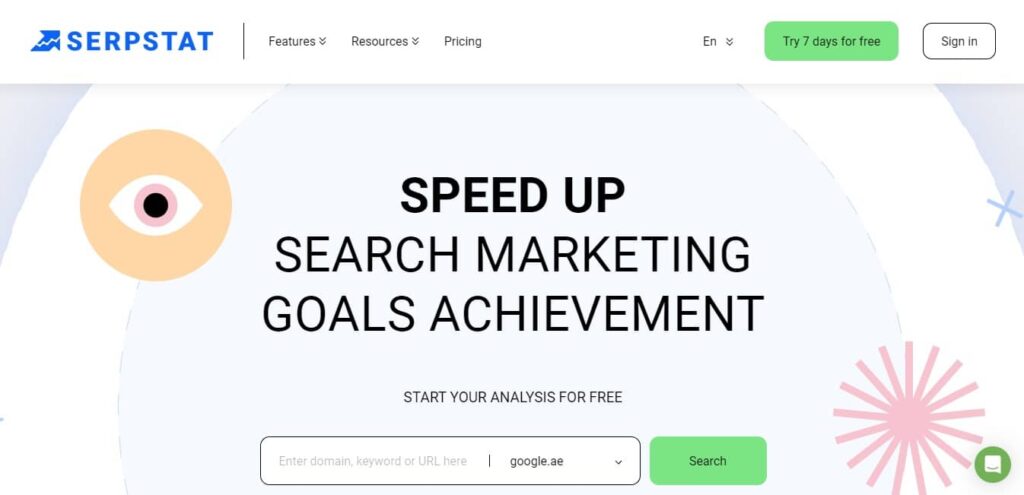
1. URL Analysis: Serpstat provides an in-depth analysis of any URL, allowing users to identify the organic and paid keywords it ranks for, along with the top competitors for those keywords. This feature helps to improve SEO strategies by analyzing competitor data and gaining insights into their tactics.
2. Keyword Research: Serpstat offers a comprehensive keyword research feature with a keyword database of over 230 million keywords. It provides various metrics like search volume, keyword difficulty, and cost-per-click (CPC). Additionally, it provides related keywords, search suggestions, and keyword trends to help users find the most relevant and profitable keywords for their campaigns.
3. Competitor Research: With Serpstat, users can analyze and track the performance of their competitors. It provides insights into their organic and paid search strategies, backlink profiles, and keyword rankings. This competitive intelligence helps users to identify their strengths and weaknesses, uncover new opportunities, and stay ahead in their industry.
1. Comprehensive Keyword Tracking: Serpstat offers a wide range of features for tracking keyword rankings, allowing you to monitor your website’s performance on search engine result pages (SERPs). It provides accurate and up-to-date data, helping you evaluate your SEO efforts effectively.
2. Competitor Analysis: This tool allows you to track and analyze the performance of your competitors, helping you identify strategies they are using and enabling you to adjust your own campaigns accordingly.
3. Site Audit: With Serpstat’s site audit feature, you can identify technical SEO issues on your website, such as broken links, duplicate content, and missing meta tags. This helps you optimize your website for better search engine visibility.
4. User-Friendly Interface: Serpstat offers a user-friendly and intuitive interface, making it easy to navigate and use, even for beginners. The dashboard provides clear and easy-to-understand data visualization.
1. Limited Historical Data: Serpstat may have limited historical data compared to some other SERP checker tools. This might be a drawback if you need long-term data analysis or if you want to track your website’s historical keyword rankings.
2. Lack of Localized Data: Some users have noted that Serpstat’s localized data for specific regions or countries is not as accurate or extensive as other SEO tools. This can be a limitation if your website primarily targets a specific geographic location.
3. Potential Data Inaccuracies: Some users have reported occasional inaccuracies in Serpstat’s data, such as incorrect keyword rankings or backlink metrics. While these instances seem to be relatively rare, it’s important to double-check and validate any data you receive through the tool.
4. Pricing Structure: Serpstat’s pricing structure may be considered a con for some users. It offers different tiers with varying limitations, and if you require access to advanced features or need higher data limits, the cost can increase significantly.
5. Limited Social Media Tracking: Unlike some other SEO tools, Serpstat doesn’t offer extensive social media tracking features. If you heavily rely on social media for your marketing efforts, you may need to use additional tools to track social media metrics effectively.
Ranktracker is a powerful SERP tracking tool utilized by digital marketers and SEO professionals around the world. Launched in 2010, it currently boasts an estimated subscriber base of over 50,000 users. The pricing range for Ranktracker starts at $19 per month, making it an affordable option for businesses of all sizes.
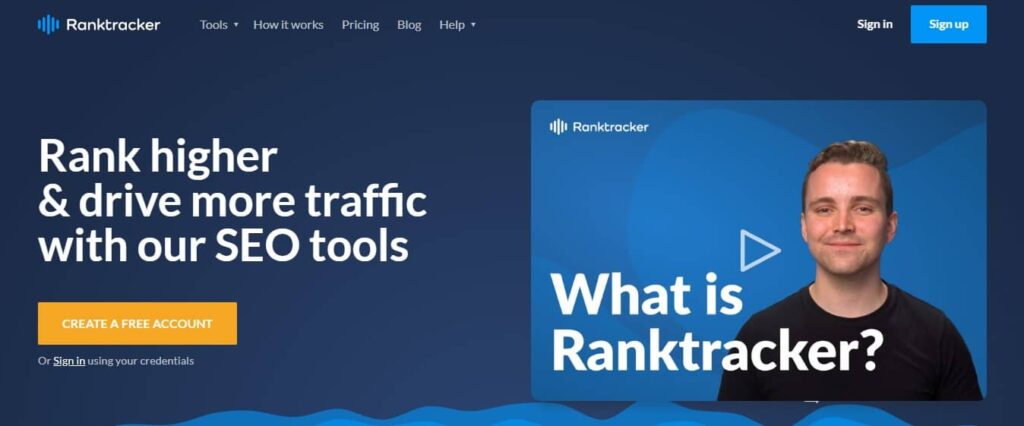
1. Accurate Rank Monitoring: Ranktracker provides accurate and up-to-date information on your website’s keyword rankings in search engine results pages (SERPs). It helps you track your website’s performance across multiple search engines and countries.
2. In-Depth Keyword Research: The tool offers an extensive keyword research feature that allows you to discover new keyword opportunities, analyze their difficulty and search volume, and track their rankings. It helps you optimize your website’s content and target the right keywords for maximum visibility.
3. Comprehensive Reporting: The tool generates detailed SERP data that showcase your website’s performance and rankings over time. You can customize and schedule these reports to be automatically sent to clients or team members. The reports provide valuable insights into your SEO efforts and help you make data-driven decisions.
1. Accurate and up-to-date rankings: Ranktracker provides real-time and accurate keyword rankings across different search engines, enabling users to monitor their website’s visibility and performance accurately.
2. Historical data and trends: Ranktracker provides historical data on keyword rankings, allowing users to identify trends and patterns over time. This data can be useful in evaluating the effectiveness of SEO campaigns and making necessary adjustments.
3. Localized tracking: The tool allows users to track their website’s rankings in specific regions or cities, providing valuable insights for local SEO strategies.
4. Customizable reports: Rank Tracker provides customizable reporting options, allowing users to generate detailed and professional reports to share with clients or team members.
1. Complexity of features: Rank Tracker has a wide range of features and settings, which can be overwhelming for beginners or users who are not tech-savvy. It may require some time and effort to familiarize oneself with the tool and optimize its usage.
2. Limited rank tracking frequency: Depending on the license and subscription plan, Rank Tracker may have limitations on the frequency of rank tracking. This can be a drawback for users who require more frequent updates or real-time monitoring.
3. Cost: Rank Tracker is a paid tool, and the cost can be a con for users who are on a tight budget or have limited resources for SEO tools.
4. Steep learning curve: Due to the tool’s rich features and advanced options, it may have a steep learning curve for novice users who are new to SEO or keyword tracking. Proper training and exploration of the tool’s functionalities are necessary to fully utilize its potential.
5. Limited integration: While Rank Tracker provides API access, it may have limited integration options with other SEO tools or platforms. This can be a drawback for users who prefer a more seamless integration of their SEO efforts across different tools.
Google Search Console is a powerful tool offered by Google to help website owners analyze and improve their site’s performance in search results. It provides valuable insights into website visibility, including performance reports, indexing status, and search queries. With its user-friendly interface and various features, Google Search Console is an essential resource for optimizing websites and driving organic traffic especially for beginners.
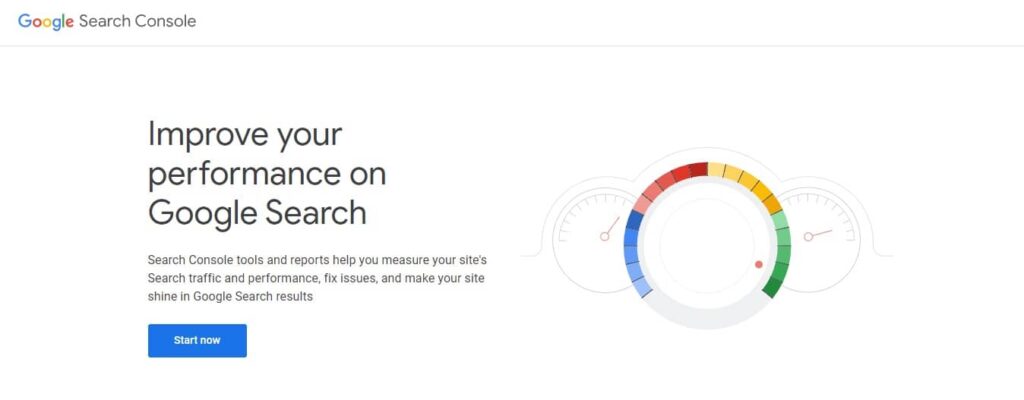
1. Search Analytics: The Search Analytics feature provides insights into how your website is performing on Google search results. It offers data on clicks, impressions, click-through rates (CTR), and average position for specific queries, pages, countries, and devices. This data helps you understand which keywords are driving traffic to your site and identify opportunities to improve your SEO efforts.
2. Index Coverage: The Index Coverage report helps you monitor the indexing status of your website’s pages. It displays information about which pages are indexed, which ones have issues, and how Google is crawling and indexing your site. This feature allows you to identify and troubleshoot any indexing problems, such as pages that are blocked or have errors, to ensure optimal visibility on search engine result pages (SERPs).
3. URL Inspection Tool: The URL Inspection tool allows you to inspect how Google sees a specific URL on your website. It provides details about the crawling, indexing, and serving process of the URL and highlights any issues or errors found. This feature helps you understand how Google is interpreting and displaying your web pages in search results, allowing you to identify and fix any potential issues.
4. Performance Report: The Performance report provides an overview of your website’s performance in Google search results. It includes data on clicks, impressions, CTR, and average position for your entire site or specific pages, queries, countries, devices, and more. This report helps you track the effectiveness of your SEO efforts over time and identify trends or opportunities to optimize your website’s visibility and performance on SERPs.
1. Accurate Google data: Its SERP tracking tool provides accurate data directly from Google, the world’s most popular search engine. This ensures the tracking and reporting data is reliable and up-to-date.
2. Comprehensive insights: The tool offers a range of metrics and reports to help track and analyze the performance of your website in search results. This includes impressions, clicks, click-through rates, average position, and more. These insights can help you make data-driven decisions to improve your website’s visibility and organic traffic.
3. Integration with other Google tools: Google Search Console can be easily integrated with other Google tools like Google Analytics, allowing you to combine data and gain a more comprehensive understanding of your website’s performance.
4. SEO optimization opportunities: The tool highlights optimization opportunities and provides recommendations to improve your website’s visibility and ranking in search results. This can help you identify technical issues, optimize site structure, improve metadata, and enhance the overall SEO of your website.
1. Limited keyword data: Google Search Console provides limited data on specific keywords that drive traffic to your website. It focuses more on the overall performance of your website rather than providing detailed keyword-level insights.
2. Delayed data: The data in Google Search Console can have a delay of a couple of days, which means you won’t get real-time information about your website’s performance. This can be a limitation if you require real-time data for monitoring or making immediate changes.
3. Limited historical data: While Google Search Console provides data for a specified time period, it doesn’t offer extensive historical data. This can restrict your ability to analyze long-term trends or compare performance over a longer duration.
4. Limited visibility into competitor data: The tool primarily focuses on your own website’s performance and doesn’t provide direct insights into your competitors’ rankings or strategies. This can make it challenging to benchmark your performance against competitors.
Overall, the Google Search Console SERP tracking tool is a valuable resource for monitoring and improving your website’s search performance, but it does have some limitations, especially in terms of keyword data and real-time metrics.
After reviewing the top 10 SERP tracking tools, it is clear that each tool offers unique features and advantages. The best tool for you will depend on your specific needs and requirements. We recommend trying out the free trials and exploring the features of each tool before making a decision. Remember to consider factors like accuracy, features, and user-friendliness to choose the best SERP tracking tool for your business.
Still searching for tools? Check out our curated list of online tools to scale your side hustle or online business.